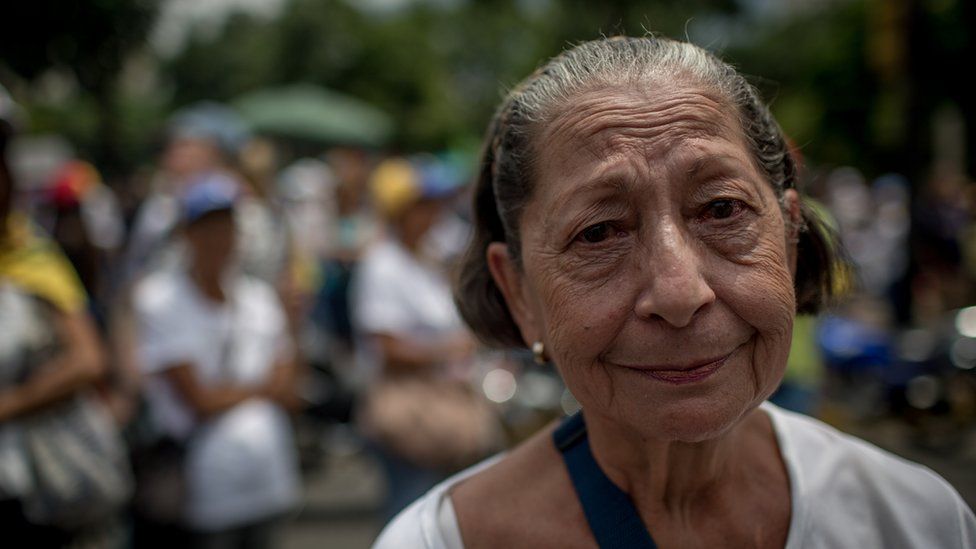Venezuela, Collapsing
"Each tear gas canister costs more than the minimum [monthly] salary, the government spends more on tear gas than providing food."
"I'm here for the youth, the students, those who are going onto the streets. We've lived our lives so we should be at the front."
Francisco Viveros, 67, university professor, Caracas, Venezuela
Riot security forces uses a pepper spray
as elderly opposition supporters confront them while rallying against
President Nicolas Maduro in Caracas, Venezuela, May 12, 2017.
REUTERS/Carlos Garcia Rawlins
|
"We ask the world to look at what's happening right now in Venezuela."
"A deranged regime that represses and kills its people."
Maria Corina Machado, opposition leader, Venezuela
"We're fighting for our children! There's no freedom of expression here in Venezuela. There's no freedom of any kind. On top of that you have shortages of medicines, of goods."The protests in Venezuela continue unabated despite the government's response, setting the military and police against the protesters with tear gas canisters being lobbed back and forth. "Sit-ins" have a tendency to begin peacefully but they soon deteriorate as demonstrators clash with soldiers and police, rocks are thrown and official vehicles set on fire. In response, state security officers fire volleys of rubber bullets and tear gas.
"This crisis is affecting my entire family. We have gone from being middle class to being much lower down. Every day we're worse off and our children don't have a future. They're killing our children [at the protests]"
"I'm here as a mother, not just for the sake of my own children but for the sake of all Venezuelan children and youths who are being unjustly repressed because this dictatorship wants to take over the country."
"The government portrays the opposition as terrorists. We're really tired of this and that's why we'll keep protesting. There are people who think that just another march won't change anything but I don't think that's true. I believe that if all of us gathered here think that way, we can achieve something."
"I will continue marching as long as my health allows it. I'm a breast cancer survivor - I've just come from my check-up and I'm fine, so I will carry on fighting for my children, for my country."
María Alvarez, 57, Caracas
Rubber bullets yes, but some protesters have been shot to death, with real, live bullets to the chest, to the head. Over three dozen people have been killed over the past months with the near-daily demonstrations refusing to be quelled. Up to two thousand protesters were detained throughout the seven weeks of protests. There are shortages of food, of elemental consumer goods, of medical supplies. But there is no shortage of crime, and of violence.
 |
'I don't feel safe at the protests, but I have to be courageous!' - Alba Fernández Torres, 74, medical doctor -- Photo ejandro Cegarra |
Maduro plans to address Venezuela's crisis himself through convening a special assembly for the specific purpose of rewriting the national constitution even while the opposition demands the immediate holding of a new presidential election at a time when polls indicate that the majority of Venezuelans are anxious to see Maduro gone. They are confronting the issues of rising violent crime and their nation descending into economic ruin.
The president's move to nullify the authority of the country's Congress controlled y the opposition had been restrained by the huge outcry and condemnation that followed the announcement. That issue and the public involvement in demonstrating outrage led to a continuing wave of protests against the socialist administration whose gross ineptitude had considerably inflamed the country's economic descent and led to rising crime rates.
Henrique Capriles, former presidential candidate who had lost to Maduro in the last presidential election amidst voter fraud and a generalized air of corruption at the polling booth, has warned the opposition is prepared to raise protests "to the next stage", even as Maduro remains determined to rewrite the constitution. "We are against this fraudulent process", Capriles announced to his radio listeners.
Labels: Controversy, Social Dysfunction, Venezuela, Violence

<< Home